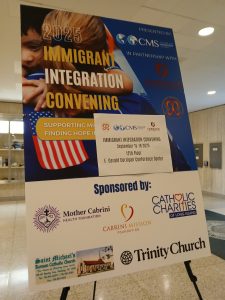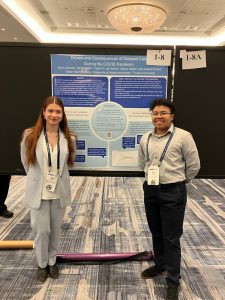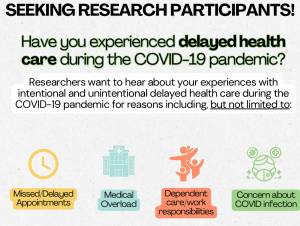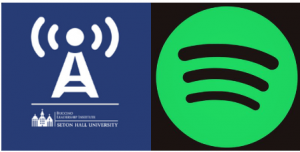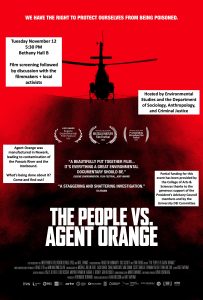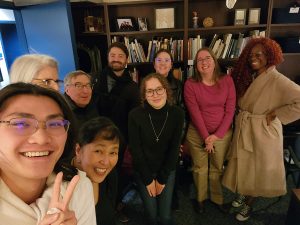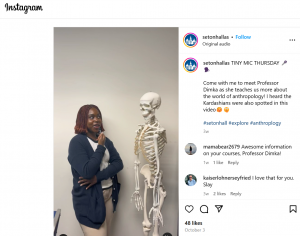As we go into the new school year, Dr. Dimka, Seton Hall’s most recent Anthropology faculty member, reflects on the previous, her first year teaching at Seton Hall.
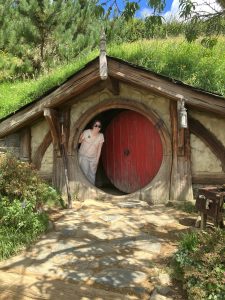
Dr. Dimka attended a workshop in Auckland, New Zealand funded by the Center for Advanced Study in Norway where she co-presented a paper on the Influenza of 1918-1920 at Non-Reservation Indian Boarding Schools. While there, she visited Hobbiton! January 2024, Photo courtesy of Dr. Dimka
Do you want to tell us a little bit about where you were before Seton Hall?
Dr. Dimka: So most recently, I was in Oslo, Norway, at Oslo Metropolitan University. I went there about four years ago on a post-doctoral fellowship to do some research, and I stayed and was co-leader of the Center for Research on Pandemics and Society.
What brought you to Seton Hall?
Dr. Dimka: Well, the job, I was ready to kind of get really back into anthropology and doing research on kind of more related topics to that than kind of the demographic stuff we were doing, and just wanting to be back in the United States and closer to my family.
How was your first year at Seton Hall?
Dr. Dimka: t’s been pretty good. Getting my bearings and figuring out how things work of course, is always interesting, but I’ve had some fun teaching new classes and developing new classes and meeting great students and other faculty. So pretty good.
What is your favorite course that you are currently teaching right now?
Dr. Dimka: It’s the Plagues and Peoples class, which is all about infectious diseases and epidemics throughout history and today in kind of the different ways that humans, biology and human culture influences that.
What would you say to someone who is unsure if they want to look more into biological anthropology versus other branches?
Dr. Dimka: That’s a good question. I think it’s particularly for a lot of people who get into biological anthropology from my own experience and other people that I’ve talked to, it’s often people who have been interested in things like health or maybe going into a medical related field or biology, and they just didn’t know what anthropology was. They never had exposure to it, for example, in high school. It’s less science-y than like really hardcore science, but more science-y than other fields within anthropology, so kind of a really intermediate kind of mixed way of thinking about how humans are.
What are you looking forward to next year?
Dr. Dimka: I’m going to be teaching the health and medicine class, which will be fun. I’m hoping to start a new research project I’m waiting to hear on a grant, so I’m really excited about that. I hope it takes off and I’m hoping to also develop maybe 1 or 2 more classes. We’ll see.
Anything you would like to mention?
Dr. Dimka: I guess thinking more about, like, how to get into anthropology and biological anthropology, just like, again, from my own experience, I would not have known about it if I hadn’t taken an elective course on Intro Archaeology my junior year of undergrad. And so I think it’s really important to not just focus on what you think you want to do coming in, and the major classes that you have to take for that, but really do embrace the kind of the alternative breadth classes. I don’t know what you call them here, the general electives that you have to take because it can open up things that you don’t expect. So I think that it’s really important, you know, you’re looking for a broader perspective than just trying to, you know, get through as fast as possible.
What led you to studying things like pandemics, epidemics and public health?
Dr. Dimka: Yeah. I started again, kind of looking at that trajectory. I was planning on going to medical school, I had different ideas of being different kinds of doctors throughout childhood. By the time I got to undergrad, I was thinking forensic pathology, so basically a coroner or something. This was before, like, Bones and CSI, it wasn’t just because of that. By the time I switched over to anthropology, I was like, okay, well, maybe I’ll be a forensic anthropologist in my master’s program. So lots of skeletal anatomy and like, actual hands-on experience doing cases for the local police and so on. And by the end of that, I was like, oh, this is really interesting and really valuable work, but I don’t know if I want to do it for my career. So for my PhD program, I applied for ones that were kind of going back to that previous question, like more general, more broad, that has a lot more kinds of other classes and other areas that I could focus on. And I started working with my PhD advisor, who does research on epidemics, and really just kind of took off from there. And I never looked back.
So you have a master’s in forensic anthropology?
Dr. Dimka: Well, it’s in biological with a focus on forensics.
Do you think you’d ever teach some sort of forensics here?
Dr. Dimka: I don’t think that I would do it as a specific class. In the fall I taught the human osteology class, and I’ll probably teach that again every once in a while, I don’t know how regular it will be. But that has aspects of forensic anthropology and bio-archaeology in there, so I don’t know if it would need to be a separate class.
This is the question that I ask a lot of alumni for the blog: What is your biggest advice to people who are currently in undergrad for specifically anthropology? Like something you would wish you had known when you were starting to study. I know you didn’t necessarily start your entire college career that way, but as you went into it.
Dr. Dimka: I think maybe my biggest advice would be to be open to unexpected changes, right, because that’s kind of has been the the trajectory of my own career of like: “I like this I’m going to go like, this feels like a good gut decision to go this way”. You know, sometimes you might be limited in what jobs are available or where you can go, but as long as you’re kind of keeping an open mind about things, which I think is a big part of anthropology too, I think you’re going to have more success whether you stay in anthropology specifically or any field you go into. Yeah, that’s my advice.
What do you hope to see in your future at Seton Hall that you would like add to the anthropology program here?
Dr. Dimka: This is a long way off so, but we have talked about possibly kind of either reframing the anthropology department or maybe like adding kind of a specific minor or something, an emphasis more on kind of maybe global health and you know, the biocultural aspects of things because, you know, that is kind of our main focus of the professors is the cultural side and not biological side. So kind of integrating that and we all have some interests in health. So I think some kind of like major or minor or something like that or a certificate maybe would be one thing that we are thinking about far off future.
And lastly, have you gotten to go to a basketball game?
Dr. Dimka: I have not gone to a basketball game yet. I did go to a new Jersey Devils game, I like hockey. I hope to get to a basketball game. I’ve been to a soccer game and plan to go to a baseball game. I want to, like, be involved in the school and support students and things, so I’m trying to do various things like that.
As Dr. Dimka goes into this new school year, she has been approved for a research grant and will begin work on that.
Learn more about Dr. Dimka through her faculty page.
